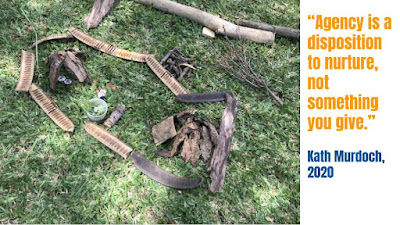3 Big Takeaways About Agency
- Sarah Hodgson
- Feb 28, 2020
- 2 min read
This academic year, as part of a ‘Personalised PD‘ initiative, four colleagues and I formed an inquiry group to explore the following questions:
What is student agency?
How do we develop a learner’s sense of agency?
How are these skills relevant to life?
What are examples of ‘agentic behaviour’?
What does it look like in different subjects/classrooms?
What is the impact of student agency on student learning?
We used two core resources:
Taryn Bond Clegg’s incredible collation of Student Agency Resources
Kath Murdoch workshop: Learner Agency Through Personal Inquiry (18th – 19th January 2020, Baar, Switzerland). My sketchnotes from the 2-day workshop are shown at the bottom of this post.
We certainly don’t have concrete answers to all of our questions… and I’m not even sure that there are any concrete answers to be found. Let’s start with a quote from Jennifer Davis Poon:
“Using the research available to us, let’s be clear with one another about student agency. It is not a fleeting behavior or an innate personality trait. It is not (just) a manifestation of free will, or an exercise of one’s vocal chords, or a “buck up and be responsible” mentality. Rather, it is a multi-faceted skill—and disposition—invoking past, present, and future. It is students’ abilities to set advantageous goals, initiate action toward those goals, and reflect and redirect based on feedback, all the while internalizing the belief they can have agency.”
My Three Big Takeaways:
1. You cannot ‘give’ agency to students.

This stood out to me more than anything else. Agency is something that can be developed, promoted, and cultivated. You cannot give agency to anyone! The idea that we can ‘give’ our learners agency by providing them with a range of activities to choose from is wrong. Agency goes way, way deeper than that.
2. Agency is not just ‘voice, choice, and ownership’.

A while back, I felt that ‘agency’ was the new buzz word. It had become more prominent in PYP documentation with the release of the Enhanced PYP and Twitter fired up with agency this and agency that. It seemed that whenever the word ‘agency’ appeared, ‘voice, choice, and ownership’ appeared right next to it, almost suggesting that the words were synonymous. They are not. The more I read, watch, and understand, the more I believe that ‘voice, choice, and ownership’ are just small parts of a bigger jigsaw in understanding the complexities of learner agency.
3. Without agency, learning can be superficial.

Think about the last time you truly learned something deeply. Did someone tell you WHAT you had to learn? Did someone tell you HOW you had to learn? WHY did you learn that? As humans, we are learning from the moment we are born to the day we die. Maybe even before birth… aren’t we learning in the womb? We self-regulate, self-monitor, and self-manage. This should not stop as soon as we walk into a classroom.
Lots more reading and learning to do… please feel free to suggest any further reading in the comments section!
Sources:
Jennifer Davis Poon (2018): What Do You Mean When You Say “Student Agency”?
Andrew Rikard (2015): ‘Student Agency’ Is Not Something You Give or Take‘
Shannon O’Dwyer (2019): ‘What Lies Beneath Student Agency‘
Will Richardson (2019): ‘Sparking Student Agency With Technology‘
Sketchnotes I drew during Kath Murdoch workshop:





Kommentare